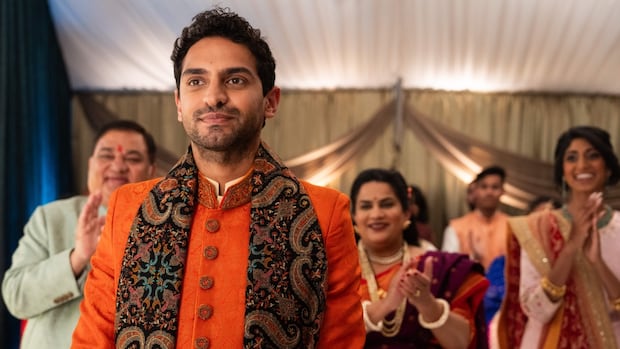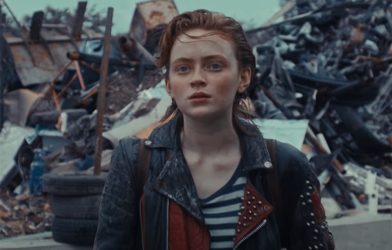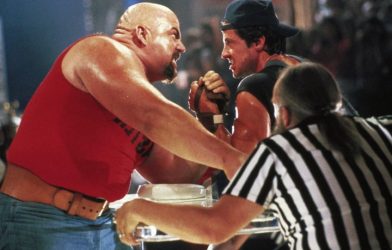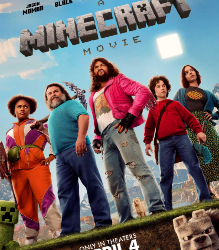Doctor-turned-filmmaker Roshan Sethi had dreamt about his own wedding for a long time. Growing up in Calgary, he’d always loved the larger-than-life weddings in Bollywood movies. In those films, however, the happy couple was always straight, while he is not. The physician came out as gay at the age of 30.
“It was hard. Initially, my family was really worried for me, because they had a tough time imagining a full and meaningful life for me,” he tells CBC Arts in a Zoom interview from his home in Los Angeles. “There was nothing to guide them. No show or TV or movie or work of literature. Nothing. It just felt really scary and unknown to them.”
It was partly because of some challenging perceptions around Sethi’s own planned wedding to actor Karan Soni that he decided to make his latest film, A Nice Indian Boy, which hits theatres across Canada on April 4.
The film centres around Naveen Gavaskar, who’s played by the director’s real-life partner, Soni. Naveen is a mild-mannered doctor whose dating life is nothing to write home about. Then again, his home life is complicated, too. While his boisterous mother Megha (stand-up comedian Zarna Garg, who brings her deadpan South Asian mom humour to her feature film debut), reserved father Archit (Harish Patel) and seemingly perfect sister Arundhati (Sunita Mani) are aware of his queer identity, they don’t truly understand Naveen.
Then, Naveen meets Jay Kurundkar (Jonathan Groff), a photographer who was adopted by Indian parents, and has grown up with all aspects of Indian culture, including Bollywood movies. Jay wants the big Indian wedding that brings a family together, despite their foibles. A family drama ensues that ultimately tests everyone’s love for each other.
A Nice Indian Boy is adapted from a 2014 play by Madhuri Shekhar. The screenplay was immediately of interest to the couple.
“For obvious reasons: that we’re both gay and Indian,” says Soni, with a dash of ironic humour. “Also, as a couple, whenever we get a chance to work together, it’s really nice. And this movie was a huge labour of love.”
Sethi and Soni previously co-wrote 7 Days, Sethi’s debut feature, in September 2020. Although they had been dating since 2018, it was the first time they worked together — Soni as the lead actor and Sethi as director. Shortly after, they worked together again on the Disney film World’s Best.

Before 7 Days, Sethi co-created the popular medical drama The Resident, while also working as a radiation oncologist in Boston. He says his frenzied dual life as a doctor and a screenwriter distracted him from being closeted. Then he watched Call Me By Your Name with a straight best friend. The movie left him in tears, which was puzzling to his friend.
“He wasn’t moved to the depths of emotion,” says Sethi. For the filmmaker, however, the movie, which is set in the 1980s, when being gay was sometimes a more secretive experience, “was such a sincere depiction of young love.”
“And then I went home and watched Angels in America,” he says. “And there was a closeted character in it who is essentially not living his life. I was very moved by that, too … So, interestingly, it was movies that made me come out, which is obviously telling — since I now make them.”
A Nice Indian Boy resonated for Soni because of the way it addressed how queer people have to come out many times over.
“I came out when I was 19, but to me the idea was you come out and everything would be fixed, and magically fine, once you said these words: ‘I am gay.’ But obviously that did not happen.” Instead, dating felt like another coming out, he says, and he ended up re-closeting parts of his life. By the time he introduced Sethi to his parents, he was in his 30s, and his parents were more curious about his life.
“Also, I was bringing home an Indian doctor, who went to Harvard,” Soni says. “So that worked out. If I was bringing home a white orphan artist boyfriend, like in the movie, I don’t know if they would have had the same reaction.”
Though they may have been scarce when Soni and Sethi were growing up, queer love stories aren’t entirely anomalous within South Asian popular culture anymore. In recent years, Bollywood has produced movies such as Ek Ladki Ko Dekha Toh Aisa Laga, Shubh Mangal Zyada Saavdhan and Badhaai Do. However, the coming out narrative is often central to their plotline. More complex queer characters are the focus of shows such as Made In Heaven, based in India, as well as the CBC series Sort Of.
A Nice Indian Boy is able to thread the needle, offering a traditional rom-com plot as well as a nuanced look at what it might mean to be South Asian and gay. This unfiltered lens was one of the script’s many appeals for Sethi.
“I think we received — as artists — some pressure during the quote-unquote diversity era to make movies that were very focused on our identities that almost didn’t have a premise,” he says. That approach often pushes plotlines, such as in The White Lotus, Sethi offers as an example, where whiteness is associated with “delicious awfulness,” while minorities are seen as martyrs.
“But the truth is minorities can be deliciously awful. That’s what’s amazing about this movie to me. Everyone has sympathetic and unsympathetic moments.… That’s because we are human beings, and it’s a glorious privilege to be allowed to be exhibited as such.”
Perhaps the most significant showcase of that humanity takes place during the film’s big wedding scene, adds Soni.

“I think we were both so nervous,” he says. The scene was shot over three days with local extras who looked like aunties and uncles the couple had grown up with.
“We were scared. Would there be a walk out of the scene?” Soni recalls worrying. “It ended up being this really beautiful thing because the extras were so moved, and the image of it was so moving. It was weirdly this healing thing. I’m so happy now it exists in film.”
A Nice Indian Boy is in theatres now.









